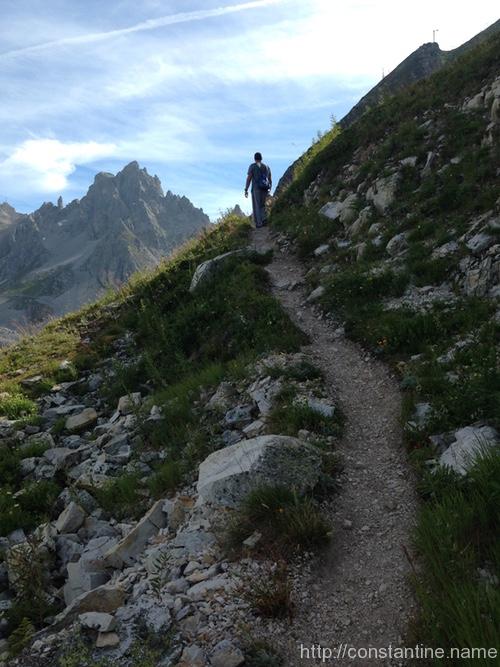I feel that I waste so many moments. I suspect you do too, because that’s the human experience as far as I’ve seen.
Hold in mind some moments you feel you’ve recently wasted. Don’t focus on the usual patsy, your phone. Think more broadly and find a few examples of time you wasted . . .
What lies at the root of why you feel those moments were wasted?
A lot of people I talk to want to decrease their usage of phones — not necessarily decreasing to zero, but decreasing impulsive usage of their phones.
~ Leo Babauta, from How to Break Dependence on the Phone
Impulsive is the problem. Which leads us immediately to start thinking of ways to change our behavior. Which we know is hard. Frankly, for me, I know that changing my behavior through reflection, planning and willpower fails every time. On the other hand, I can easily do what I want to do. That stuff can be really hard—like sweating in deadly heat hard—and it gets done.
What do you want to do instead of the time you’ve said was wasted?
To create a meaningful work of art or to make a discovery or invention requires great discipline, self-control, and emotional stability. It requires mastering the forms of your field. […] When you look at the exceptionally creative work of Masters, you must not ignore the years of practice, the endless routines, the hours of doubt, and the tenacious overcoming of obstacles these people endured.
~ Robert Greene
I’m often working to figure out what I’m going to delete from my life. I often begin with the things I feel are wastes of my time.
‘Dagon’ has all the elements of a classic Lovecraft tale. Here, as in many of his later works – including ‘The Call of Cthulhu’ (written in 1926), The Dream-Quest of Unknown Kadath (1927), and At the Mountains of Madness (1931) – optimistic endeavours for knowledge, even the simple act of seeing what’s on the other side of a hill, are thwarted by incomprehensible terrors and a horrifyingly arbitrary cosmic order. These revelations shatter the minds of Lovecraft’s truth-seeking characters, including doctors, archaeologists, lost sailors, metaphysicians and scientists of all kinds.
~ Sam Woodward, from Terrifying vistas of reality
Some people must think that reading a bunch of Lovecraft’s work was time I wasted. I loved it. I didn’t find it scary (I’m not sure I’ve ever found any book scary. Movies, on the other hand, can scare the hell out of me.) But I deeply enjoyed Lovecraft… and yet I could never quite express why. After reading Woodward’s thoughts I’m thinking I enjoyed the experience—being myself one of those “doctors, archaeologists, lost sailors, metaphysicians and scientists of all kinds”—of seeing people like me get the hell scared out of them.
Effort isn’t the point, impact is. If you solve the problem in three seconds but have the guts to share it with me, it’s still art. And if you move ten thousand pounds of granite but the result doesn’t connect with me, I’m sorry for your calluses, but you haven’t made art, at least not art for me.
~ Seth Godin
That’s a rare quote where even though I feel there’s something muddled (“solving a problem” and “making art”) it still has a beautiful, clear point: There’s an important difference between effort and impact.
Above, Greene mentioned the effort creatives put into their craft because knowing that (hopefully) enables people to get through our own efforts. Godin’s idea feels like it continues a thread, and should appear right after Greene’s in some missing guidebook for creatives.
[How do you know if something will last or not?] Well, you don’t! That’s a form of arrogance! I think that if you can somehow tell some kind of truth or at least get to some sense of truth… Then it will last. Because then you’ve reached some kind of primal understanding of something that will transport you over time. But I don’t sit here and say, “Is this going to be great and last?” I don’t think so. I just try to make it something that has a sense of something that matters, you know, that makes it of value.
~ Eric Roth, from Eric Roth
Eric Roth wrote the screenplay for Forrest Gump, an adaptation of the book.
The impulse to keep to yourself what you have learned is not only shameful, it is destructive. Anything you do not give freely and abundantly becomes lost to you. You open your safe and find ashes.
~ Annie Dillard
Somewhen in the last decade I switched to believing everyone is a creative. It’s part of our birthright. Simply, make something of value. Yes, put in the effort. But it’s the impact that matters!
David Lynch has a variety of notions about what it takes to make art, but suffering is not among them. “This is part of the myth, I think […] the more you suffer, the less you want to create. If you’re truly depressed, they say, you can’t even get out of bed, let alone create.”
~ Colin Marshall, from David Lynch Explains Why Depression Is the Enemy of Creativity–and Why Meditation Is the Solution
The cure for depression? My experience is that the only thing that works to avoid depression, in the long run, is meditation.
Until next time, thanks for reading.
ɕ
PS: Have you noticed I’ve built an entirely new web site for 7 for Sunday? Check it out. I’d love to hear your comments…
